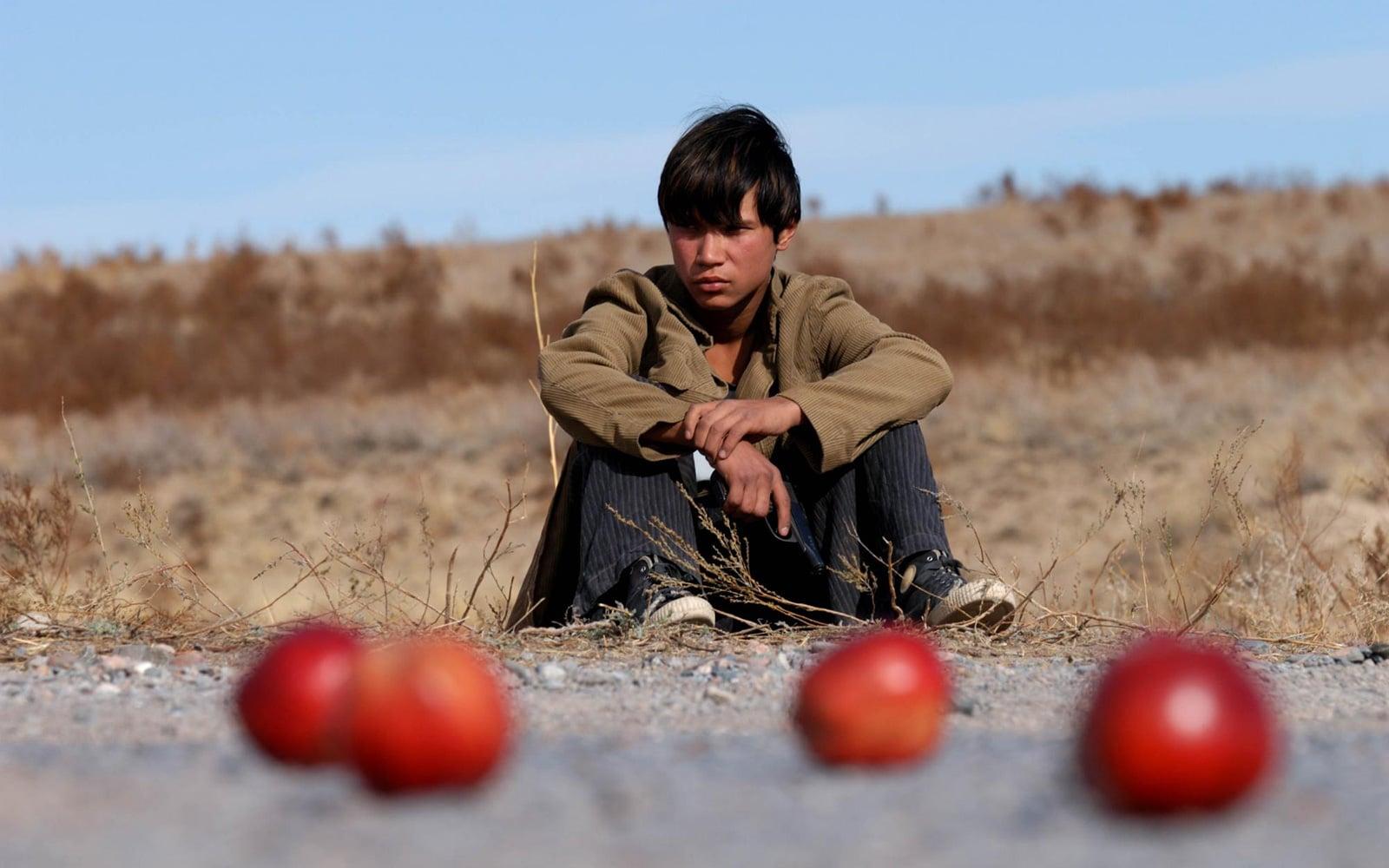Schizo by Gulshat Omarova (Review)

I’m pretty sure I’ve made this clear in previous reviews, but one of the reasons why I enjoy foreign films so much is that they provide a chance to truly see another culture through the eyes of “natives.” Looking back on Schizo, which was shot in rural (and I mean rural) Kazakhstan, I’d have to say that I enjoyed the environment in which it was set far more than almost any other aspect of the movie… though the movie has plenty of other things going for it as well.
Schizo tells the story of a young 14-year-old boy named Mustafa. Everyone, however, calls him “Schizo” because of his mental condition (although I found him more autistic than schizophrenic). There aren’t too many job prospects in the desolate country, for Schizo or anyone else, outside of the illegal bareknuckle boxing matches that are set up by Sakura, his mother’s boyfriend. So Schizo spends his days on the back of Sakura’s motorcycle, trying to enlist migrant workers for the matches.
When a fighter dies following a match, Schizo takes it upon himself to visit Zinka, the dead man’s widow, and her son, and deliver some money. However, “takes it upon himself” might be a bit too strong of a description. There’s very little evidence that anything or anyone really seems to affect Schizo in any way. He just seems to drift through life, rather ambivalent of it all. But for whatever reason, be it out of guilt or simply hoping to sleep with Zinka, Schizo begins doing his best to help them out.
Unfortunately, the migrant workers are onto Sakura’s operation, and Schizo is arrested the next time he shows up looking for fighters. Trying to find a good candidate for an upcoming big fight, Schizo enlists his uncle, who spends his sober time stealing cable from the disused electrical towers that dot the landscape. His uncle wins and takes home the prize (the local gangster’s Mercedes), but the gangster is none too happy when he finds out that Schizo and the victor are related. Suspecting an inside job, he starts putting pressure on Sakura, who in turn starts tracking down Schizo.
Although the film has several double crosses and twist or two, it’s the furthest thing from a crime thriller that you could find. And even though the main character is a boy on the cusp of manhood, it’s not really a “coming of age” story either. Part of the reason for that is due to Schizo himself, who seems less a character than a cipher, a body that is there merely for everyone else to react to. He never says much, and when he does, it’s usually not the brightest or most interesting thing in the world. However, when the film enters its final act, it becomes apparent that there’s a bit more going on in his head than the viewer was previously led to believe, which sets up a nice little twist.
However, I have to admit that I found myself less interested by the plot than the world in which the film is set. The rural regions of Kazakhstan may be desolate, but writer/director Gulshat Omarova seems to love them as much as her characters, if not moreso. The landscape is littered with all manner of bizarre housing, and the people who inhabit them come off as tough and resourceful, as they’ve obviously taken and used whatever they could find to survive. Schizo’s uncle, for example, lives in an abandoned grain silo of sorts. Omarova seems to delight in showing us such things, and highlights them at every chance. And using a number of long shots, she puts us smack dab in the middle of the region’s vast prairies and wide open expanses. Such things lend an almost documentary authenticity to the film.
The other thing I found constantly intriguing were the people groups present in the film. Representing a mixture of European, Asian, and Middle-Eastern cultures, it was often difficult to tell where one culture ended and the next began. For example, Schizo looks Middle-Eastern, but his mother and Sakura are definitely Western, whereas his uncle is Asian. Zinka has blond hair and a fair complexion, while her son (the movie’s most delightful and unassuming character) has a Chinese cast to his features.
This sense of ambiguity seems to fuel the film, and certainly seems to define Schizo. Which is probably why I was a bit disappointed by the film’s ending, which seemed a bit too upbeat and tacked on for my taste. Perhaps I just prefer downbeat endings in general, but I do wish the film had ended a few minutes earlier. Here, we see Schizo visit Zinka’s son, having just survived an ordeal in which he gave into the violence and ambivalence that surrounded his life. He heads off into the wilderness as a train rolls by in the background, once again lost and aimless by the actions of his own hand. It would’ve been a powerful final image, one in which character and environment perfectly merge.